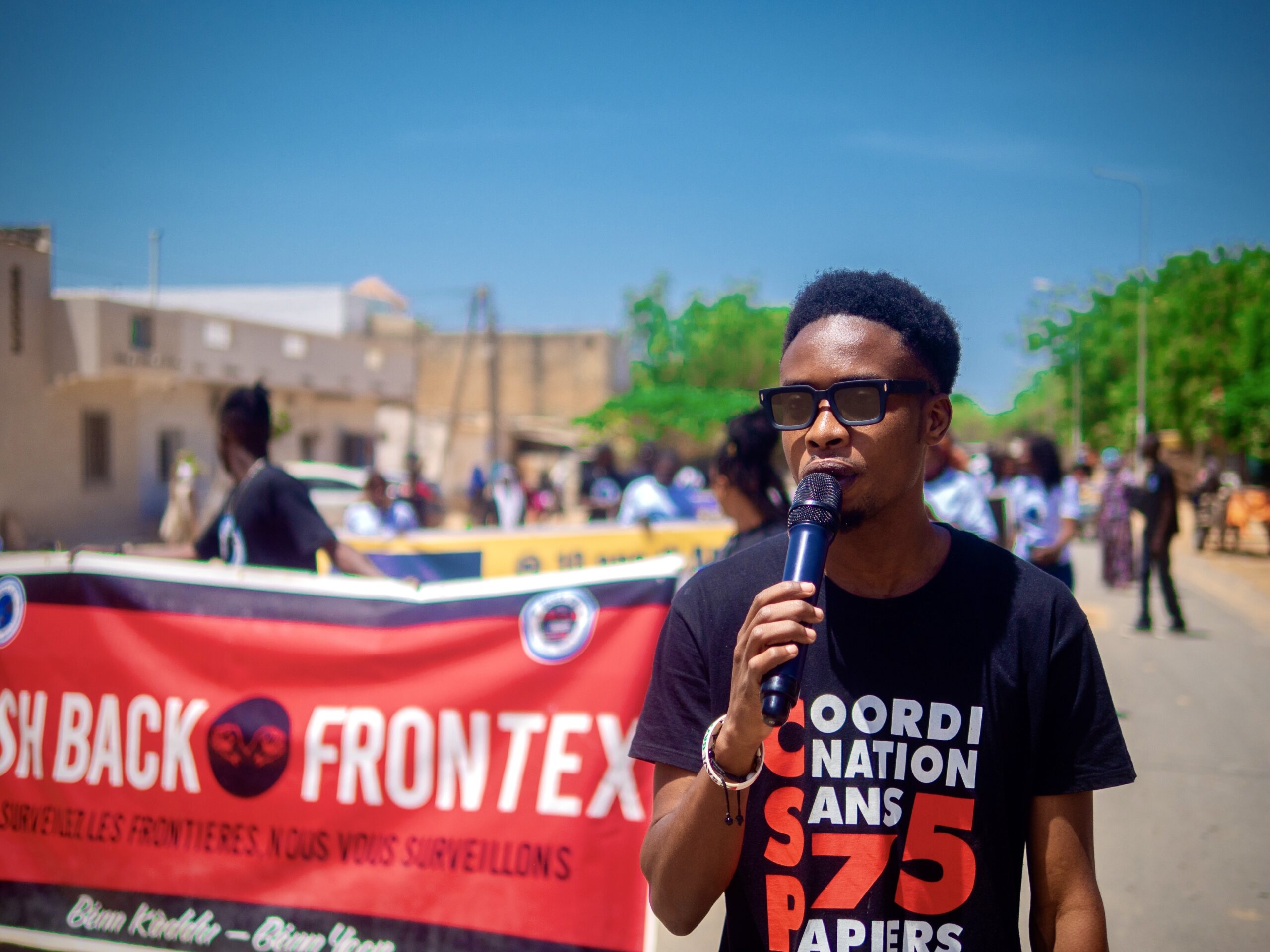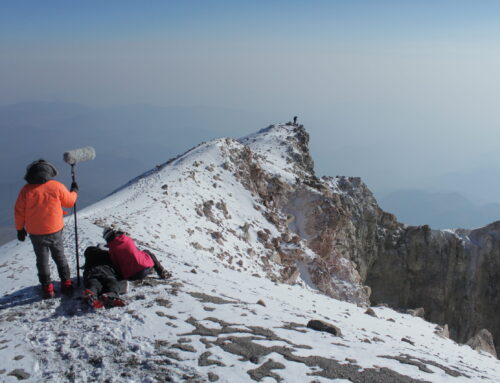
Activists from Boza Fii Association at the Push Back Frontex event in Dalifort, Senegal, 2023. Photo courtesy of Boza Fii/ Alassane Sow.
“Without visas, migrating by boat is the only alternative,” declared migrant rights activist Aminata Mboye at a press conference in Mbour, Senegal, in May 2025. This press conference took place at a yearly event protesting EU border externalization—the strategy of outsourcing migration control to non-EU countries to prevent migrants from reaching European territory. The event was organized by the Senegalese migrant rights activist group Boza Fii in Aminata’s hometown 100km south of Dakar. Rather than condemning those who took the risk of migrating by boat, Aminata and other speakers condemned the EU policies that helped make the Atlantic route from the western African shore to the Canary Islands one of the “most lethal migration routes in the world” (Caminando Fronteras 2024).
Aminata had lost her own son in 2020 when at 19 he died attempting to migrate to Spain. In the wake of this shock she created a community group bringing together more than 100 people whose family members had died on this migration route. Many of the people listening to her speech were skeptical of the Senegalese government and NGO-led raising awareness campaigns that aimed to convince people not to migrate by boat, in a context where industrial fishing and climate change have made fishing livelihoods untenable (Jönsson 2019). “The sea here cannot be unspoiled,” said a father in the audience, referring to the effects of industrial fishing on their livelihoods, “so I will never tell a young person—even my own child—not to take the boats if he wants to.” He was responding to the campaigns that targeted his hometown to stop youth from wanting to migrate, which often focus on parents and elders.
War against emigration
Mbour and fishing communities like it now have many local associations composed of those who have lost family members to unauthorized migratory routes. These organizations often position themselves as fighting against emigration in what has become a highly saturated field of NGOs, UN and EU agencies, and state-run programs. Since the 1990s, the EU has funded programs through local partners to stop sea departures by targeting young people with raising awareness campaigns about the dangers of migrating by sea and job training programs intended to create an alternative to economic migration. These programs, already the object of numerous critiques by activist groups and scholars, continue despite the dramatic rise in migration departures since they began (ECRE 2024).
These programs and initiatives are now accompanied by more repressive measures and militarized border technologies. In October 2024, the EU announced a 30-million-euro package to “prevent irregular migration from Senegal” (Le Monde 2024a). The funds go primarily to policing and military programs, including border control, surveillance, and anti-smuggling initiatives. Frontex (European border control) operates in Senegal and Mauritania, where the Spanish national police and the Guardia civil also participate in patrols. On April 22, 2025, the permanent secretary of the Senegalese Interministerial Council for the Fight against Irregular Migration (CILMI) announced that they would step up their efforts to reduce unauthorized migration. This announcement diminished Senegalese migrant rights activists’ hopes that Senegal’s new president, Bassirou Diomaye Faye, elected in March 2024 after a broad-based popular movement (Maclean 2024), would end the war against migration. Instead, the government has increased the militarization of migrant control, with Diomaye Faye vowing to “relentlessly hunt down” migrant smugglers, who have become the agreed upon bogeyman, accused of profiting on the potential for migrant death (Le Monde 2024b). These policies end up criminalizing migrant-sending communities.
If externalization is the “offshoring and outsourcing” of border control beyond the EU external borders (Olud Moctar 2024), anti-emigration community associations are its soft power flip side, with the assumption that they offer a depoliticized language of maternal mourning and loss to promote the message: do not leave. Political scientist Emmanuelle Bouilly documents this tendency to “mobilize without protest” in her book on a Senegalese women’s association fighting against emigration (Bouilly 2019). This depoliticizing assumption is false, as mothers’ social movements across the world illustrate. The discourse of anti-emigration in Senegal, however, focusing on anti-trafficking and the tragedy of deaths in the Atlantic, makes it difficult to build a vocabulary to claim migrant rights and freedom of movement without being accused of encouraging unauthorized departures and loss of life.
The effect of the fight against emigration is to transform young Senegalese people into “potential migrants” and to construct their desire to depart into something pathological. Policies against irregular migration configure migrants’ desire as based on a deeply ingrained but erroneous value and belief system that needs to be reformed and replaced with the desire to stay and engage in life in Senegal. These policies configure migrants, their families, and their socio-cultural environment as the cause of so-called irregular migration. Although these policies have failed in reducing migrant death and departure, they help produce new social categories (“the potential migrant”) and pathologies as the objects of further campaigns and repression initiatives. If migrant death is to be stopped, according to this logic, people must stop wanting to leave.
Pushing back against the pathologization of migration
Refusing the anti-emigration framework and its vocabulary, Aminata has faced administrative obstacles in making her group—the Senegal Victims of Emigration Collective (COVES)—into an officially recognized organization. She has rejected local authorities’ suggestion that she add the word “irregular” to her organization’s name. If she did so, she would better correspond to the Senegalese government’s approach carried out through the CILMI and to the many EU initiatives involved in that fight (European Parliament 2017). Together, these institutions are not only creating an industry but also a war against migrants—in which people on the move are configured as the root cause of the problem, and thus the enemy. There are many parallels to the unwinnable “war on drugs” that ended up criminalizing the most vulnerable people and strengthening cartels. But what Aminata points out is how much the true perpetrators—those responsible for migrant death at sea—remain unscathed and almost forgotten in the migrant protection machine that has blossomed alongside border militarization.
Activists in Boza Fii push back against pathologizing narratives in the war on migrants by refocusing the attention on the policies that produce unauthorized migration in the first place. Boza Fii was founded by Senegalese migrants who had met in Morocco, where they became early members of an international migrant rights and sea rescue activist network. Initially organizing to protect themselves from police violence, they developed an activist framework centered on freedom and rights—departing from the victim-centered language used by the UN, NGOs, and many experts, and joining a small but growing group of migrant-founded activist groups in West Africa focused on freedom of movement (Lecadet 2023). They discursively mobilize the militarized logic of bordering to denounce unjust practices. “You are watching us, we are watching you,” reads one banner at their Push Back Frontex event in Mbour. “The real culprit in migrant deaths at sea are European policies,” said the association president, Saliou Diouf, at the event.
Their analysis emerges through their experience in Morocco, at the crossroads of unauthorized migratory routes in the Mediterranean and the Atlantic. Highlighting their alternative ways to do “sensibilisation,” anthropologist Ida Marie Savio Vammen points out “how activists reappropriate conventional MIC [migration information campaign] communication strategies merging them with new forms of transborder collective action to challenge EU externalisation” (Vammen 2025, 4). Similarly, the language of mourning has also been repurposed as a call for justice: Boza Fii coordinates with activists in North Africa and Europe to compile a list of the people who died attempting to migrate. They display it at their event under the slogan: “neither forgetting, nor forgiveness,” written in French, Wolof, and Arabic.
In 2025, the final event of Push Back Frontex was a concert of engaged local and Dakarois rappers. Accustomed to MICs, many young people present initially thought the event was about telling them not to migrate. They were surprised by the references to Frontex, which they had never heard of, and the slogans about unqualified “freedom of movement,” leading them to ask more questions of the association members who were also in the crowd. Boza Fii recruited several new members in Mbour, some of whom had lost family members on migrant routes. The concert became a moment of collective effervescence in which dreaming—of safe departure, of the abolition of borders, of belonging—could still be imagined.
Combining the political rhetoric of sovereignty recently used in Senegal to demand the removal of French army bases (Olumba 2025), with the language of free movement coming from international migrant rights activism, activists are creating a new vocabulary of resistance to the militarization of borders. “We see them as potential activists,” said one member of Boza Fii, “not as potential migrants. Their desire to migrate is between them and God.”
References
Bouilly, Emmanuelle. 2019. Du couscous et des meetings contre l’émigration clandestine: Mobiliser sans protester au Sénégal. Paris: Dalloz.
Caminando Fronteras. 2024. “Monitoring the Right to Life 2024.”
ECRE (European Council on Refugees and Exiles). 2024. “Atlantic Route and Spain – news report.” December 5.
European Parliament. 2017. “Lutte contre l’immigration irrégulière et gestion des frontières,” July 13.
Jönsson, Jessica H. 2019. “Overfishing, Social Problems, and Ecosocial Sustainability in Senegalese Fishing Communities.” Journal of Community Practice 27 (3–4): 213–30.
Lecadet, Clara. 2023. Les expulsés, sujets politiques. Open Edition Books.
Le Monde. 2024a. “EU announces €30 million package to prevent irregular migration from Senegal.” October 16. .
Le Monde. 2024b. “Au Sénégal, le président promet une « traque sans répit » du trafic de migrants.” September 12.
Maclean, Ruth. 2024. “Senegal’s Youngest Elected Leader Wants a New World Order.” New York Times, September 25.
Ould Moctar, Hassan. 2024. After Border Externalization: Migration, Race, and Labour in Mauritania. London: Bloomsbury Academic.
Olumba, Ezenwa. 2025. “Senegal sees French troops depart as west Africa reassesses colonial ties.” The Conversation, March 28.
Vammen, Ida Marie Savio. 2025. “Speaking up against EU externalisation: Activist-led migration information campaigns in Senegal.” CMI Brief (01).
Julie Kleinman is Associate Professor of Anthropology at Fordham University. The author of the book Adventure Capital: Migration and the Making of an African Hub in Paris, she conducts research in Mali, Senegal, and France on social mobilizations for migrant rights.
Cite as: Kleinman, Julie. 2025. “Resisting the War on Migrants in Senegal”. In “Bordering and the War on Migration”, edited by Anna Simone Reumert, Wendy Vogt, and Charlie Piot, American Ethnologist website, 23 September 2025. [https://americanethnologist.org/online-content/resisting-the-war-on-migrants-in-senegal-by-julie-kleinman/]
This piece was edited by American Ethnological Society Digital Content Editor Kathryn E. Goldfarb (kathryn.goldfarb@colorado.edu).




